
Holger Börner was a German politician of the SPD.
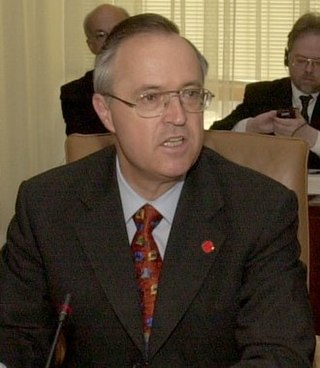
The 1999 Hessian state election was held on 7 February 1999 to elect the members of the 15th Landtag of Hesse. The outgoing government was a coalition of the Social Democratic Party (SPD) and The Greens led by Minister-President Hans Eichel.

The 2008 Lower Saxony state election was held on 27 January 2008 to elect the members of the 16th Landtag of Lower Saxony. The incumbent coalition government of the Christian Democratic Union (CDU) and Free Democratic Party (FDP) led by Minister-President Christian Wulff was re-elected with a reduced majority.

Andrea Ypsilanti is a German politician.
The politics of Hesse takes place within a framework of a federal parliamentary representative democratic republic, where the Federal Government of Germany exercises sovereign rights with certain powers reserved to the states of Germany including Hesse. The state has a multi-party system where, as in most other states of former Western Germany and the federal level, the two main parties are the centre-right Christian Democratic Union (CDU) and the centre-left Social Democratic Party of Germany (SPD).

Tarek Mohammed Al-Wazir is a German politician of Alliance '90/The Greens who served as deputy to the Hessian Minister-President, and Hessian Minister of Economics, Energy, Transport and Regional Development from 2014 to 2024. He is a member of the Landtag of Hesse and was co-chair of the Hessian Green Party.

The Landtag of Hesse is the unicameral parliament of the State of Hesse in the Federal Republic of Germany. It convenes in the Stadtschloss in Wiesbaden. As a legislature it is responsible for passing laws at the state level and enacting the budget. Its most important function is to elect and control the state government. The constitution of the State of Hesse describes the role of the Landtag in sections 75 to 99.
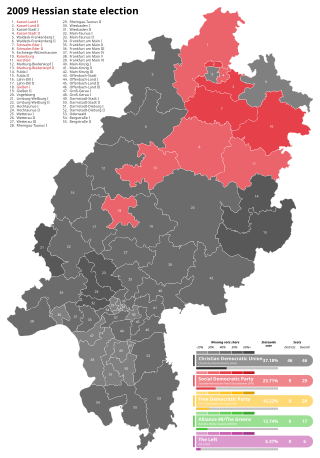
The 2009 Hessian state election was held on 18 January 2009 to elect the members of the Landtag of Hesse. The election was called after the failure of all government formation attempts conducted after the 2008 state election held a year earlier. The Social Democratic Party (SPD) suffered major losses, falling from an effective tie with the Christian Democratic Union (CDU) to a 13.5-point deficit. The Free Democratic Party (FDP) and The Greens were the primary beneficiaries of the SPD's decline. After the election, the CDU formed a coalition government with the FDP, and Roland Koch was elected Minister-President.

The 2009 Schleswig-Holstein state election was held on 27 September 2009 to elect the members of the Landtag of Schleswig-Holstein. It was held on the same day as the 2009 federal election and the 2009 Brandenburg state election.
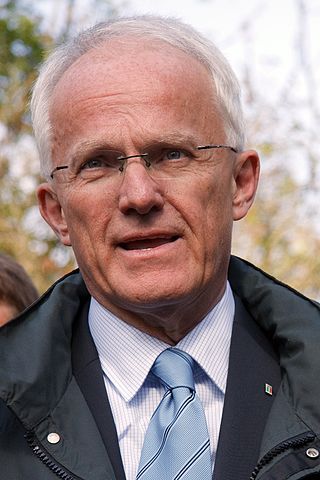
The 2010 North Rhine-Westphalia state election was held on 9 May 2010 to elect the 15th Landtag of North Rhine-Westphalia. The outgoing government was a coalition of the Christian Democratic Union (CDU) and Free Democratic Party (FDP) led by Minister-President Jürgen Rüttgers.
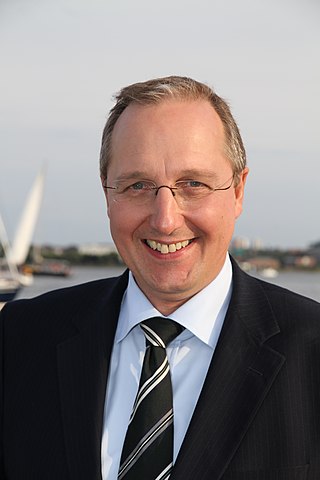
The 2012 Schleswig-Holstein state election was held on 6 May 2012 to elect the members of the Landtag of Schleswig-Holstein. The incumbent coalition government of the Christian Democratic Union and Free Democratic Party (FDP) was defeated. Though the CDU remained the largest party, the Social Democratic Party (SPD) negotiated a coalition with The Greens and the South Schleswig Voters' Association (SSW). This was dubbed the "Danish traffic light" or "Namibia coalition". SPD leader Torsten Albig was subsequently elected Minister-President by the Landtag.

The 2016 Baden-Württemberg state election was held on 13 March 2016 to elect the members of the 15th Landtag of Baden-Württemberg. The incumbent government of The Greens and the Social Democratic Party (SPD) led by Minister-President Winfried Kretschmann lost its majority.

The 2018 Hessian state election was held on 28 October 2018 to elect the members of the Landtag of Hesse. The outgoing government was a coalition of the Christian Democratic Union (CDU) and The Greens led by Minister-President Volker Bouffier.

The 2019 Thuringian state election was held on 27 October 2019 to elect the members of the 7th Landtag of Thuringia. The outgoing government was a coalition consisting of The Left, the Social Democratic Party (SPD), and The Greens, led by Minister-President Bodo Ramelow.

The 1991 Hessian state election was held on 20 January 1991 to elect the members of the 13th Landtag of Hesse. The outgoing government was a coalition of the Christian Democratic Union (CDU) and Free Democratic Party (FDP) led by Minister-President Walter Wallmann.
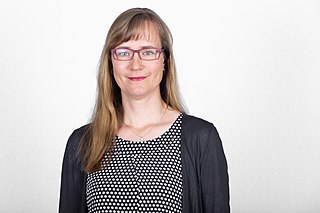
The 2021 Saxony-Anhalt state election was held on 6 June 2021 to elect the 8th Landtag of Saxony-Anhalt. The outgoing government was coalition of the Christian Democratic Union (CDU), Social Democratic Party (SPD), and The Greens, led by Minister-President Reiner Haseloff.
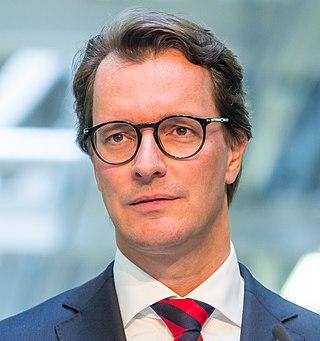
The 2022 North Rhine-Westphalia state election was held on 15 May 2022 to elect the 18th Landtag of North Rhine-Westphalia. The outgoing government was a coalition of the Christian Democratic Union (CDU) and Free Democratic Party (FDP) led by Minister-President Hendrik Wüst.

The Third Bouffier cabinet was the state government of Hesse between 2019 and 2022, sworn in on 18 January 2019 after Volker Bouffier was elected as Minister-President of Hesse by the members of the Landtag of Hesse. It was the 22nd Cabinet of Hesse.
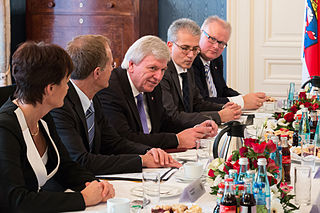
The Second Bouffier cabinet was the state government of Hesse between 2014 and 2019, sworn in on 18 January 2014 after Volker Bouffier was elected as Minister-President of Hesse by the members of the Landtag of Hesse. It was the 21st Cabinet of Hesse.

The 2023 Hessian state elections was held on Sunday October 8, to elect the 21st Landtag of Hesse. The outgoing government was a coalition of the Christian Democratic Union and The Greens, led by Minister-President Boris Rhein of the CDU. The 2023 Bavarian state election was held the same day.























